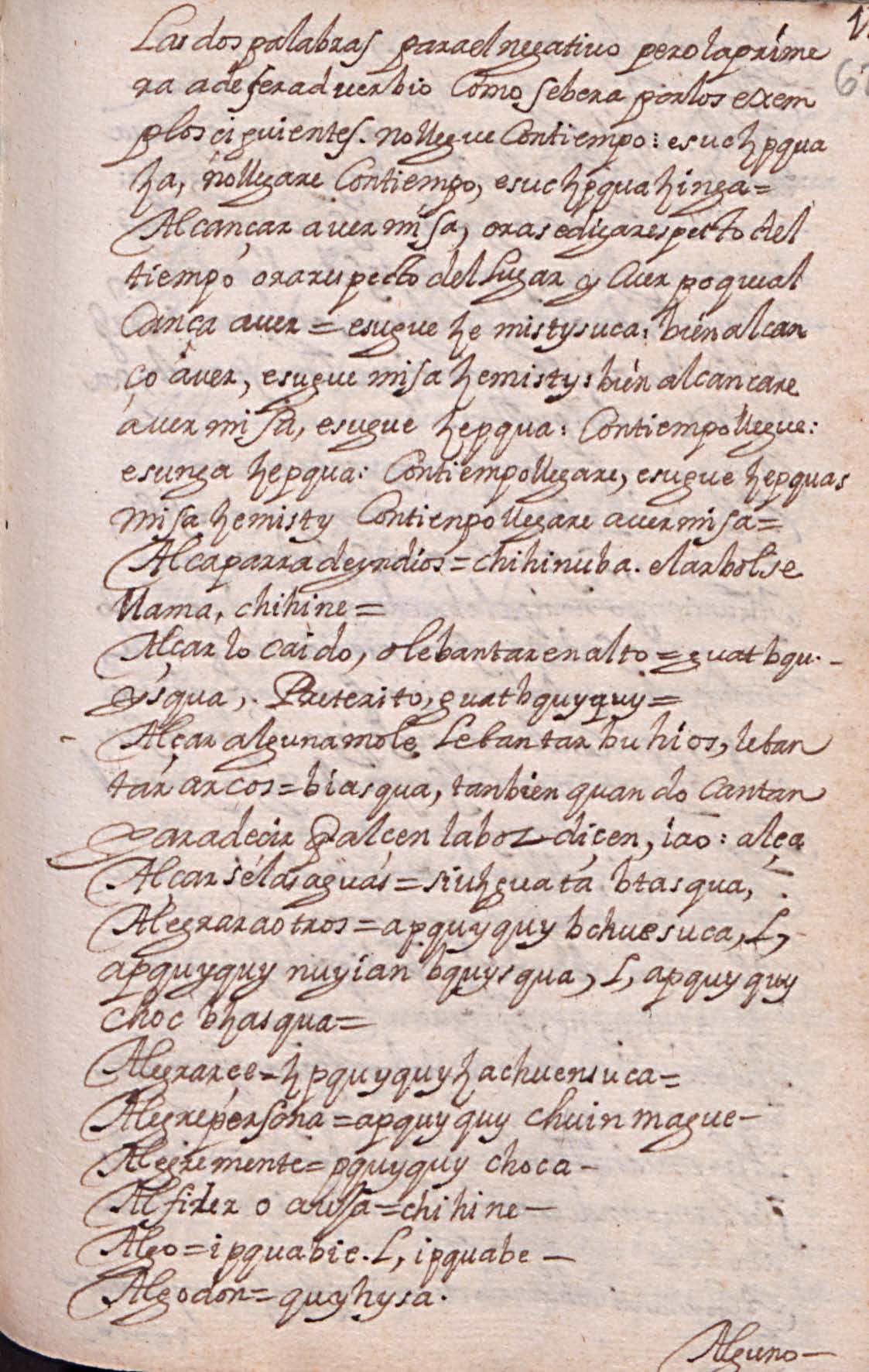De Muysc cubun - Lengua Muisca
m |
m |
||
| Línea 10: | Línea 10: | ||
# Alcançar a uer míʃa, ora se diga respecto del <br> tiempo ora respecto del Lugar y Cuerpo que al[-]<br> cança a uer = '''<sup>[[a-|a]]</sup>[[isu|esu]][[gue]] [[ze-|ze]][[-m|m]][[istysuca|isty]][[-suca|suca]]''', bíen alcan[-]<br> ço a ver, '''<sup>[[a-|a]]</sup>[[isu|esu]][[gue]] [[misa|miʃa]] [[ze-|ze]][[-m|m]][[istysuca|isty]]''': bièn alcançare <br> a uer miʃa, '''<sup>[[a-|a]]</sup>[[isu|esu]][[gue]] [[ze-|ze]][[pquasqua|pqua]]''': Con tiempo llegue: <br> '''<sup>[[a-|a]]</sup>[[isu|esu]][[-nga|nga]] [[ze-|ze]][[pquasqua|pqua]]''': Con tiempo llegare, '''<sup>[[a-|a]]</sup>[[isu|esu]][[gue]] [[ze-|ze]][[pquasqua|pqua]][[-s|s]]''' <br> '''[[misa|miʃa]] [[ze-|ze]][[-m|m]][[istysuca|isty]]''' Con tienpo llegare a uer miʃa= <br> | # Alcançar a uer míʃa, ora se diga respecto del <br> tiempo ora respecto del Lugar y Cuerpo que al[-]<br> cança a uer = '''<sup>[[a-|a]]</sup>[[isu|esu]][[gue]] [[ze-|ze]][[-m|m]][[istysuca|isty]][[-suca|suca]]''', bíen alcan[-]<br> ço a ver, '''<sup>[[a-|a]]</sup>[[isu|esu]][[gue]] [[misa|miʃa]] [[ze-|ze]][[-m|m]][[istysuca|isty]]''': bièn alcançare <br> a uer miʃa, '''<sup>[[a-|a]]</sup>[[isu|esu]][[gue]] [[ze-|ze]][[pquasqua|pqua]]''': Con tiempo llegue: <br> '''<sup>[[a-|a]]</sup>[[isu|esu]][[-nga|nga]] [[ze-|ze]][[pquasqua|pqua]]''': Con tiempo llegare, '''<sup>[[a-|a]]</sup>[[isu|esu]][[gue]] [[ze-|ze]][[pquasqua|pqua]][[-s|s]]''' <br> '''[[misa|miʃa]] [[ze-|ze]][[-m|m]][[istysuca|isty]]''' Con tienpo llegare a uer miʃa= <br> | ||
# Alcaparra de yndíos = '''[[chihinuba]]'''. el arbol se <br> llama, '''[[chihine]]'''= <br> | # Alcaparra de yndíos = '''[[chihinuba]]'''. el arbol se <br> llama, '''[[chihine]]'''= <br> | ||
| − | # Alçar lo caido, o lebantar en alto = '''[[guata|guat]] [[-b|b]][[quysqua(2)|qu'''[-]<br> ''' | + | # Alçar lo caido, o lebantar en alto = '''[[guata|guat]] [[-b|b]][[quysqua(2)|qu'''[-]<br> '''y]][[-squa|squa]]''', Preterito, '''[[guata|guat]] [[-b|b]][[quysqua(2)|quyquy]]''' = <br> |
# Alçar alguna mole Lebantar buhíos, leban[-]<br> tar arcos = '''[[-b|b]][[iasqua(2)|ia]][[-squa|squa]]''', tanbìen quando cantan <br> para deçir ʠ alçen la boz diçen, '''[[iasqua(2)|ia]][[-o(3)|o]]''': alça <br> | # Alçar alguna mole Lebantar buhíos, leban[-]<br> tar arcos = '''[[-b|b]][[iasqua(2)|ia]][[-squa|squa]]''', tanbìen quando cantan <br> para deçir ʠ alçen la boz diçen, '''[[iasqua(2)|ia]][[-o(3)|o]]''': alça <br> | ||
# Alçarse las aguas = '''[[siu(2)|siu]][[-z|z]] [[guata|guat]] [[a-|a]][[-b|b]][[tasqua|ta]][[-squa|squa]]''', <br> | # Alçarse las aguas = '''[[siu(2)|siu]][[-z|z]] [[guata|guat]] [[a-|a]][[-b|b]][[tasqua|ta]][[-squa|squa]]''', <br> | ||
Revisión del 10:12 10 may 2023
Lematización[1]
11
- Las dos palabraʃ para el negatiuo pero la príme[-]
ra a de ʃer adverbio Como ʃe bera por los exem[-]
plos çiguienteʃ. no llegue Con tiempo: aesuc zpqua[-]
za, no llegare Con tiempo, aesuc zpquazinga= - Alcançar a uer míʃa, ora se diga respecto del
tiempo ora respecto del Lugar y Cuerpo que al[-]
cança a uer = aesugue zemistysuca, bíen alcan[-]
ço a ver, aesugue miʃa zemisty: bièn alcançare
a uer miʃa, aesugue zepqua: Con tiempo llegue:
aesunga zepqua: Con tiempo llegare, aesugue zepquas
miʃa zemisty Con tienpo llegare a uer miʃa= - Alcaparra de yndíos = chihinuba. el arbol se
llama, chihine= - Alçar lo caido, o lebantar en alto = guat bqu[-]
ysqua, Preterito, guat bquyquy = - Alçar alguna mole Lebantar buhíos, leban[-]
tar arcos = biasqua, tanbìen quando cantan
para deçir ʠ alçen la boz diçen, iao: alça - Alçarse las aguas = siuz guat abtasqua,
- Alegrar a otros = apquyquy bchuesuca, L,
apquyquy nuyían[2] bquysqua, L, apquyquy
choc bzasqua = - Alegrarçe = zpquyquyz achuensuca =
- Alegre perʃona = apquyquy chuin mague.
- Alegremente = pquyquy choca.
- Alfiler o aguja = chihine.
- Algo = ipquabie. L, ipquabe.
- Algodon = quyhysa.
Alguno
Fotografía[3]

Referencias
- ↑ Lematización realizada manualmente por Diego F. Gómez, usando como base a Gómez & Torres. Transcripción Raro Manuscrito 158 BNC. ICANH. 2014. Esta lematización se realizó gracias al apoyo del Instituto Colombiano de Antropología e Historia.
- ↑ Creemos que lo correcto debió haber sido muyian.
- ↑ Fotografía tomada del R.M. 158 de la Biblioteca Nacional de Colombia, gracias a la colaboración de su Coordinador de Colecciones y Servicios.
